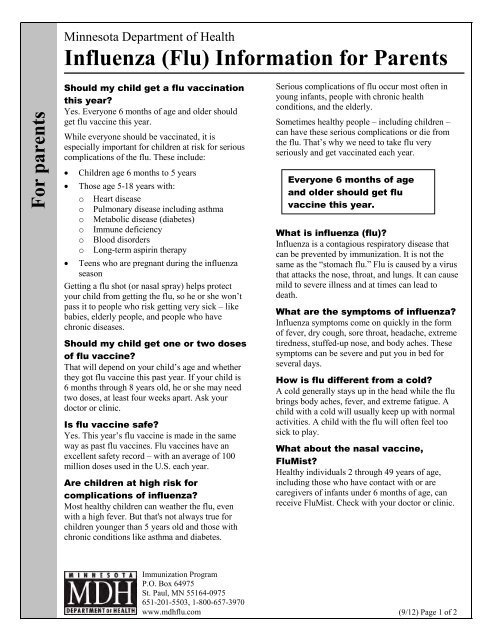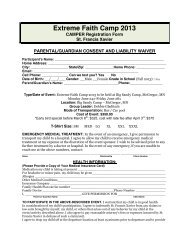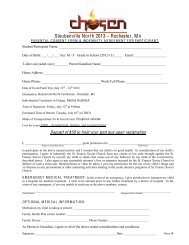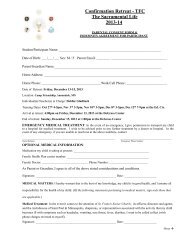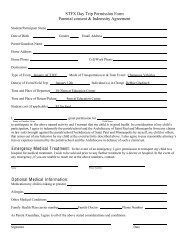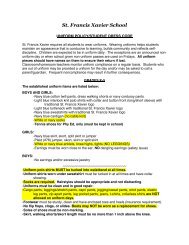Influenza (Flu) Information for Parents - Minnesota Dept. of Health
Influenza (Flu) Information for Parents - Minnesota Dept. of Health
Influenza (Flu) Information for Parents - Minnesota Dept. of Health
You also want an ePaper? Increase the reach of your titles
YUMPU automatically turns print PDFs into web optimized ePapers that Google loves.
<strong>Minnesota</strong> Department <strong>of</strong> <strong>Health</strong><br />
<strong>Influenza</strong> (<strong>Flu</strong>) <strong>In<strong>for</strong>mation</strong> <strong>for</strong> <strong>Parents</strong><br />
For parents<br />
0BShould my child get a flu vaccination<br />
this year?<br />
Yes. Everyone 6 months <strong>of</strong> age and older should<br />
get flu vaccine this year.<br />
While everyone should be vaccinated, it is<br />
especially important <strong>for</strong> children at risk <strong>for</strong> serious<br />
complications <strong>of</strong> the flu. These include:<br />
<br />
<br />
Children age 6 months to 5 years<br />
Those age 5-18 years with:<br />
o Heart disease<br />
o Pulmonary disease including asthma<br />
o Metabolic disease (diabetes)<br />
o Immune deficiency<br />
o Blood disorders<br />
o Long-term aspirin therapy<br />
Teens who are pregnant during the influenza<br />
season<br />
Getting a flu shot (or nasal spray) helps protect<br />
your child from getting the flu, so he or she won’t<br />
pass it to people who risk getting very sick – like<br />
babies, elderly people, and people who have<br />
chronic diseases.<br />
1BShould my child get one or two doses<br />
<strong>of</strong> flu vaccine?<br />
That will depend on your child’s age and whether<br />
they got flu vaccine this past year. If your child is<br />
6 months through 8 years old, he or she may need<br />
two doses, at least four weeks apart. Ask your<br />
doctor or clinic.<br />
3BIs flu vaccine safe?<br />
Yes. This year’s flu vaccine is made in the same<br />
way as past flu vaccines. <strong>Flu</strong> vaccines have an<br />
excellent safety record – with an average <strong>of</strong> 100<br />
million doses used in the U.S. each year.<br />
4BAre children at high risk <strong>for</strong><br />
complications <strong>of</strong> influenza?<br />
Most healthy children can weather the flu, even<br />
with a high fever. But that's not always true <strong>for</strong><br />
children younger than 5 years old and those with<br />
chronic conditions like asthma and diabetes.<br />
Serious complications <strong>of</strong> flu occur most <strong>of</strong>ten in<br />
young infants, people with chronic health<br />
conditions, and the elderly.<br />
Sometimes healthy people – including children –<br />
can have these serious complications or die from<br />
the flu. That’s why we need to take flu very<br />
seriously and get vaccinated each year.<br />
Everyone 6 months <strong>of</strong> age<br />
and older should get flu<br />
vaccine this year.<br />
5BWhat is influenza (flu)?<br />
<strong>Influenza</strong> is a contagious respiratory disease that<br />
can be prevented by immunization. It is not the<br />
same as the “stomach flu.” <strong>Flu</strong> is caused by a virus<br />
that attacks the nose, throat, and lungs. It can cause<br />
mild to severe illness and at times can lead to<br />
death.<br />
6BWhat are the symptoms <strong>of</strong> influenza?<br />
<strong>Influenza</strong> symptoms come on quickly in the <strong>for</strong>m<br />
<strong>of</strong> fever, dry cough, sore throat, headache, extreme<br />
tiredness, stuffed-up nose, and body aches. These<br />
symptoms can be severe and put you in bed <strong>for</strong><br />
several days.<br />
7BHow is flu different from a cold?<br />
A cold generally stays up in the head while the flu<br />
brings body aches, fever, and extreme fatigue. A<br />
child with a cold will usually keep up with normal<br />
activities. A child with the flu will <strong>of</strong>ten feel too<br />
sick to play.<br />
What about the nasal vaccine,<br />
<strong>Flu</strong>Mist?<br />
<strong>Health</strong>y individuals 2 through 49 years <strong>of</strong> age,<br />
including those who have contact with or are<br />
caregivers <strong>of</strong> infants under 6 months <strong>of</strong> age, can<br />
receive <strong>Flu</strong>Mist. Check with your doctor or clinic.<br />
Immunization Program<br />
P.O. Box 64975<br />
St. Paul, MN 55164-0975<br />
651-201-5503, 1-800-657-3970<br />
www.mdhflu.com<br />
(9/12) Page 1 <strong>of</strong> 2
<strong>Influenza</strong> (<strong>Flu</strong>) <strong>In<strong>for</strong>mation</strong> <strong>for</strong> <strong>Parents</strong> – page 2<br />
8B<br />
01BWhen should my family get<br />
vaccinated?<br />
Everyone 6 months <strong>of</strong> age and older should<br />
get a flu shot every year. For best protection,<br />
flu vaccine is usually given in the fall be<strong>for</strong>e<br />
flu season starts. But you can get it anytime<br />
during flu season.<br />
1BWhat if you think you or your child<br />
has the flu?<br />
<br />
<br />
<br />
<br />
<br />
<br />
Stay home if you are ill and keep your child<br />
home from school or daycare if they are ill.<br />
Rest and drink lots <strong>of</strong> fluids.<br />
Antibiotics will not help a person recover from<br />
the flu, because flu is caused by a virus, not by<br />
bacteria.<br />
Children <strong>of</strong>ten need help keeping their fever<br />
under control. Follow your child’s doctor’s<br />
instructions.<br />
Take your child to the doctor or the emergency<br />
room if he or she:<br />
o Breathes rapidly or with difficulty<br />
o Has bluish skin color<br />
o Does not drink enough and becomes<br />
dehydrated<br />
o Does not wake up or interact with others<br />
o Is so irritable that he or she doesn't want to<br />
be held, or<br />
o Gets better only to become sick again,<br />
with fever and a more severe cough<br />
If you are concerned that something does not<br />
seem right with your child, call your doctor or<br />
clinic.<br />
21BWhat can you do to protect yourself<br />
and others?<br />
<br />
<br />
<br />
<br />
<br />
<br />
Get vaccinated.<br />
Avoid being exposed to others who are sick<br />
with a flu-like illness.<br />
Cover your nose and mouth with a tissue when<br />
you cough or sneeze, or cough or sneeze into<br />
your sleeve.<br />
Clean your hands <strong>of</strong>ten – with soap and water<br />
or an alcohol-based, waterless hand sanitizer.<br />
Don't expose infants unnecessarily to large<br />
crowds when influenza is in your community.<br />
Avoid close contact between the baby and<br />
family members who may be sick.<br />
Do not share drinking cups and straws.<br />
<br />
<br />
Frequently clean commonly touched surfaces<br />
(door knobs, refrigerator handles, phones,<br />
water faucets).<br />
Do not smoke around children.<br />
What about antiviral medicines?<br />
Antiviral medicines can <strong>of</strong>fer some protection, but<br />
they are only recommended <strong>for</strong> use in certain<br />
groups <strong>of</strong> people. If you have questions about<br />
antivirals, talk to your doctor.<br />
Find a flu shot at<br />
HUwww.mdhflu.comU<br />
<strong>Minnesota</strong> Department <strong>of</strong> <strong>Health</strong> – Immunization Program (9/12) Page 2 <strong>of</strong> 2


